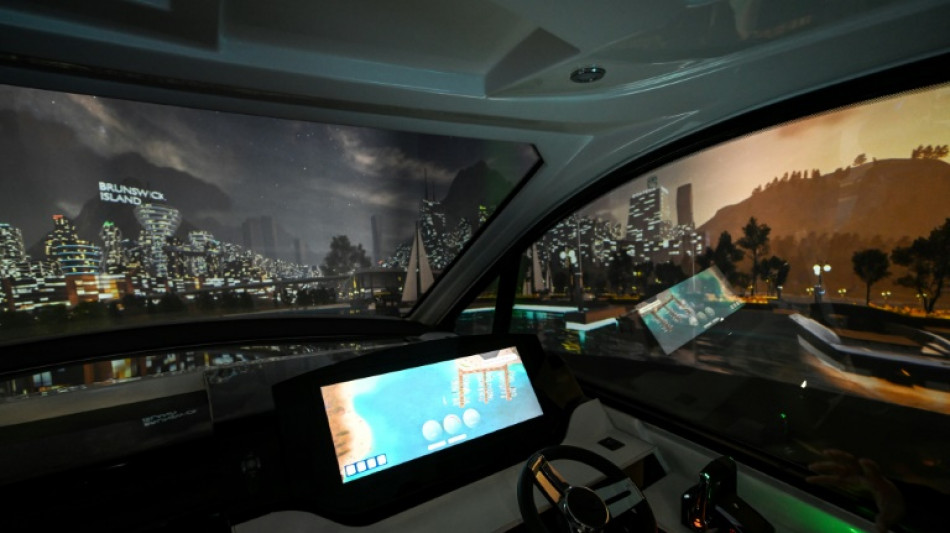
-
 A stadium and a jersey for Argentina's 'Captain' Francis
A stadium and a jersey for Argentina's 'Captain' Francis
-
New Trump task force vows to root out 'anti-Christian bias'
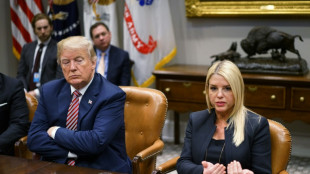
-
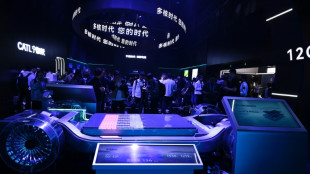 Auto Shanghai showcases new EV era despite tariff speedbumps
Auto Shanghai showcases new EV era despite tariff speedbumps
-
Trump's administration moves to scrap artificial food dyes

-
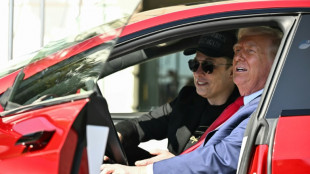 Musk to reduce White House role as Tesla profits plunge
Musk to reduce White House role as Tesla profits plunge
-
US official backs off promise to solve cause of autism by September

-
 Guardiola joy as Man City go third after dramatic win over Villa
Guardiola joy as Man City go third after dramatic win over Villa
-
Trump says has 'no intention' of firing Fed chief

-
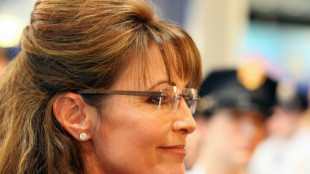 Jury finds New York Times did not libel Sarah Palin
Jury finds New York Times did not libel Sarah Palin
-
UN appoints envoy to assess aid for Palestinians

-
 Celtics star Tatum 'doubtful' for game two against Magic
Celtics star Tatum 'doubtful' for game two against Magic
-
Former England star Flintoff reveals mental battle after car crash

-
 Defending champion Korda chases first win of season at Chevron Championship
Defending champion Korda chases first win of season at Chevron Championship
-
Olmo fires Liga leaders Barca past Mallorca

-
 Nunes strikes at the death as Man City sink Villa to boost top-five bid
Nunes strikes at the death as Man City sink Villa to boost top-five bid
-
Tesla says profits plunge 71%, warns of 'changing political sentiment'
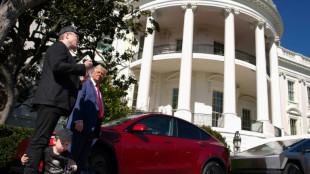
-
 WHO announces 'significant' layoffs amid US funding cuts
WHO announces 'significant' layoffs amid US funding cuts
-
PSG draw with Nantes to stay unbeaten in Ligue 1

-
 Trump's administration moves to ban artificial food dyes
Trump's administration moves to ban artificial food dyes
-
Gunmen kill dozens of civilians in Kashmir tourist hotspot

-
 US Treasury chief expects China tariff impasse to de-escalate
US Treasury chief expects China tariff impasse to de-escalate
-
I.Coast opposition leader Thiam barred from presidential election
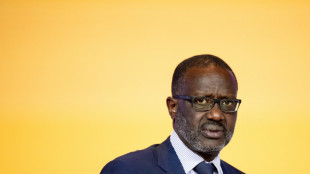
-
 Top US court leans toward parents in case on LGBTQ books in schools
Top US court leans toward parents in case on LGBTQ books in schools
-
At least 24 killed in Kashmir attack on tourists

-
 Rahul powers Delhi to big win over Lucknow in IPL
Rahul powers Delhi to big win over Lucknow in IPL
-
Colombian cycling star 'Lucho' Herrera denies murder conspiracy

-
 Trump, Zelensky to attend Pope Francis's funeral Saturday
Trump, Zelensky to attend Pope Francis's funeral Saturday
-
US State Department to cut positions, rights offices

-
 Ukraine ready for direct talks with Russia only after ceasefire: Zelensky
Ukraine ready for direct talks with Russia only after ceasefire: Zelensky
-
Myanmar Catholics mourn pope who remembered their plight

-
 Pope's Vatican 'family' pay tearful respects
Pope's Vatican 'family' pay tearful respects
-
The world leaders set to attend Pope Francis's funeral

-
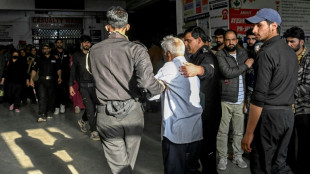 'Like a storm': Witnesses describe deadly Kashmir attack
'Like a storm': Witnesses describe deadly Kashmir attack
-
Volkswagen unveils its electric counter-offensive in China
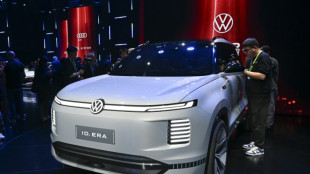
-
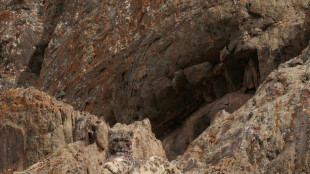 Landmark Nepal survey estimates nearly 400 elusive snow leopards
Landmark Nepal survey estimates nearly 400 elusive snow leopards
-
Napoleon letter auction recalls French pope detention

-
 Saka injury 'nothing serious' as Arteta weighs Arsenal options
Saka injury 'nothing serious' as Arteta weighs Arsenal options
-
Rubio to cut positions, rights offices at US State Department

-
 Trump says 'on the same side of every issue' with Netanyahu after call
Trump says 'on the same side of every issue' with Netanyahu after call
-
ECB's Lagarde hopes Trump won't fire US Fed chief Powell
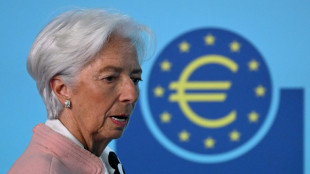
-
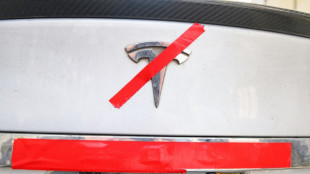 Gold hits record as Trump fuels Fed fears, Wall Street rebounds
Gold hits record as Trump fuels Fed fears, Wall Street rebounds
-
The world leaders set to attend Francis's funeral

-
 East Timor mourns Pope Francis months after emotional visit
East Timor mourns Pope Francis months after emotional visit
-
US envoy to visit Moscow as US pushes for ceasefire

-
 At least 24 killed in Kashmir attack on tourists: Indian police source
At least 24 killed in Kashmir attack on tourists: Indian police source
-
Philippine typhoon victims remember day Pope Francis brought hope

-
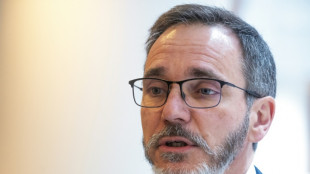 IMF slashes global growth outlook on impact of Trump tariffs
IMF slashes global growth outlook on impact of Trump tariffs
-
BASF exits Xinjiang ventures after Uyghur abuse reports
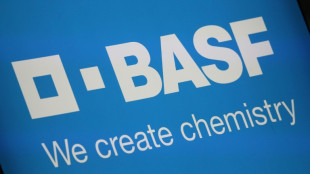
-
 Nordics, Lithuania plan joint purchase of combat vehicles
Nordics, Lithuania plan joint purchase of combat vehicles
-
Gold hits record, stocks diverge as Trump fuels Fed fears
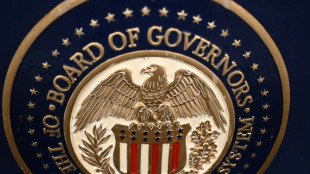

At CES, sailor-less ships head to port on AI wave
Whether on pleasure yachts or deep-sea cargo ships, AI-backed navigation assistance and autonomy are helping captains set sail for sunsets or simply moor in a port scratch-free.
At the CES technology show in Las Vegas, boat builders are putting a big focus on technologies and artificial intelligence that make it easier for both the weekend yachtie and seasoned sailor to head out to sea.
"On the water, there is wind, currents, sometimes waves, the boat does not stay in place, you always have to compensate," said Johan Inden, president of the marine business at Swedish company Volvo Penta.
For more than ten years, the company's boats have helped mariners maneuver using a simple joystick that holds a ship in position or thrusts it sharply to the right or left.
Volvo Penta unveiled a prototype in 2018 that was capable of letting the boat dock by itself, but customers weren't ready to park their ships at the click of a button, Inden said.
Instead, the company developed the docking assistance system "that gives the captain a certain level of control" when mooring the boat, a moment "that remains one of the most stressful in sailing."
In general, the idea is to improve "safety, comfort, relaxation" and eventually make boating more accessible, he said.
A boat prototype by US company Brunswick offers the best trajectory to enter a port, avoid collisions and finds available places to dock a boat and does the job without human intervention.
Another software program, offered by Hyundai's Avikus, can help maximize pleasure at sea.
One setting will ensure that the boat is ideally positioned for sunbathing or will find the best spot to enjoy the sunset and get there in time to see it.
The goal, according to company executive Carl Johansson, is to provide fuel savings, safety, and "peace of mind."
- 'Reduce crew' -
For merchant mariners, autonomous sailing is in test phase.
In Norway, an autonomous electric cargo ship has been transporting fertilizer from factory to port since last year, with the aim of reducing truck traffic.
While in Japan, an automated full-sized ferry has been in operation between two islands since last year, though for now with a crew on board.
If the reality of ships entirely without human sailors remains elusive, many navigation tools can provide valuable help, in ports or to calculate the best route according to weather.
A computer guided journey "provides much more reliable transportation," said John Cross of Memorial University in Canada.
HD Hyundai, which at CES unveiled a project to collect and analyze shipping data, said that its software will slow a ship's speed if the destination port is congested, thereby reducing fuel consumption.
Autonomy tools can also be useful in helping with maintenance by monitoring the condition of engines or propellers.
In the long run, the goal of companies is to "reduce the number of crew members," said John Cross. They may see it as a way to save money, but also to reduce risks as accidents on board are still frequent.
It is also a way of dealing with the ageing of professional seafarers and difficulties in recruiting.
The growth of work on autonomous navigation has recently been helped by the decision of the International Maritime Organization (IMO) to work on setting rules, said Rudy Negenborn of Delft University in the Netherlands.
It is still forbidden to operate an autonomous boat in international waters and new regulations are not expected before 2028.
The technologies also need refining to enhance safety, reduce energy consumption and determine which are the best sensors and what to do if they fail, said Negenborn.
In any case, "there will always be a human somewhere," he said. Whether it's a sailor following a computer on board or a supervisor on land managing several boats.
G.Schulte--BTB




